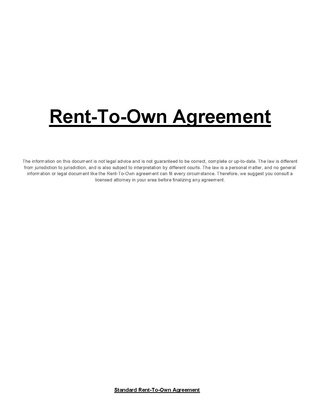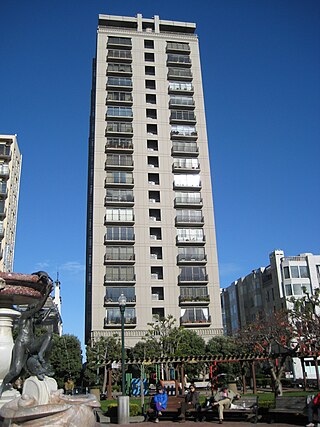
Renting, also known as hiring or letting, is an agreement where a payment is made for the use of a good, service or property owned by another over a fixed period of time. To maintain such an agreement, a rental agreement is signed to establish the roles and expectations of both the tenant and landlord. There are many different types of leases. The type and terms of a lease are decided by the landlord and agreed upon by the renting tenant.

A landlord is the owner of a house, apartment, condominium, land, or real estate which is rented or leased to an individual or business, who is called a tenant. When a juristic person is in this position, the term landlord is used. Other terms include lessor, housing provider, and owner. The term landlady may be used for the female owners. The manager of a pub in the United Kingdom, strictly speaking a licensed victualler, is referred to as the landlord/landlady. In political economy it refers to the owner of natural resources alone from which an economic rent, a form of passive income, is the income received.

A lease is a contractual arrangement calling for the user to pay the owner for the use of an asset. Property, buildings and vehicles are common assets that are leased. Industrial or business equipment are also leased. Basically a lease agreement is a contract between two parties: the lessor and the lessee. The lessor is the legal owner of the asset, while the lessee obtains the right to use the asset in return for regular rental payments. The lessee also agrees to abide by various conditions regarding their use of the property or equipment. For example, a person leasing a car may agree to the condition that the car will only be used for personal use.
A leasehold estate is an ownership of a temporary right to hold land or property in which a lessee or a tenant has rights of real property by some form of title from a lessor or landlord. Although a tenant does hold rights to real property, a leasehold estate is typically considered personal property.
Section 8 of the Housing Act of 1937, commonly known as Section 8, provides rental housing assistance to low-income households in the United States by paying private landlords on behalf of these tenants. Approximately 68% of this assistance benefits seniors, children, and individuals with disabilities. The Department of Housing and Urban Development (HUD) oversees Section 8 programs, which are administered locally by public housing agencies (PHAs).
Key money is one of several forms of payment made to a landlord. The term has various meanings in different parts of the world. It sometimes means money paid to an existing tenant who assigns a lease to a new tenant where the rent is below market. It sometimes means a bribe to a landlord. In other parts of the world, it is used synonymously with normal security deposits, which are used to cover nonpayment of rent and excessive damage to a rental unit.

A Lease-Purchase Contract, also known as a lease purchase agreement or rent-to-own agreement, allows consumers to obtain durable goods or rent-to-own real estate without entering into a standard credit contract. It is a shortened name for a lease with option to purchase contract. For real estate, a lease purchase contract combines elements of a traditional rental agreement with an exclusive right of first refusal option for later purchase of the home.
A rental agreement is a contract of rental, usually written, between the owner of a property and a renter who desires to have temporary possession of the property; it is distinguished from a lease, which is more typically for a fixed term. As a minimum, the agreement identifies the parties, the property, the term of the rental, and the amount of rent for the term. The owner of the property may be referred to as the lessor and the renter as the lessee.
Subsidized housing is government sponsored economic assistance aimed towards alleviating housing costs and expenses for impoverished people with low to moderate incomes. In the United States, subsidized housing is often called "affordable housing". Forms of subsidies include direct housing subsidies, non-profit housing, public housing, rent supplements/vouchers, and some forms of co-operative and private sector housing. According to some sources, increasing access to housing may contribute to lower poverty rates.
Tax withholding, also known as tax retention, pay-as-you-earn tax or tax deduction at source, is income tax paid to the government by the payer of the income rather than by the recipient of the income. The tax is thus withheld or deducted from the income due to the recipient. In most jurisdictions, tax withholding applies to employment income. Many jurisdictions also require withholding taxes on payments of interest or dividends. In most jurisdictions, there are additional tax withholding obligations if the recipient of the income is resident in a different jurisdiction, and in those circumstances withholding tax sometimes applies to royalties, rent or even the sale of real estate. Governments use tax withholding as a means to combat tax evasion, and sometimes impose additional tax withholding requirements if the recipient has been delinquent in filing tax returns, or in industries where tax evasion is perceived to be common.
Jeonse, also known as chŏnse, key money deposit or key money, is a type of lease or deposit common in the South Korean real estate market. Instead of paying monthly rent, a renter will make a lump-sum deposit on a rental space, at anywhere from 50% to 80% of the market value, which is then returned at the end of the lease term. The owners make profit from reinvesting the jeonse deposit, instead of receiving the monthly rent. It is also possible to combine a lower jeonse with a small monthly rent.
Buy-to-let is a British phrase referring to the purchase of a property specifically to let out, that is to rent it out. A buy-to-let mortgage is a mortgage loan specifically designed for this purpose. Buy-to-let properties are usually residential but the term also encompasses student property investments and hotel room investments.
Landlord harassment is the willing creation, by a landlord or their agents, of conditions that are uncomfortable for one or more tenants in order to induce willing abandonment of a rental contract. This is illegal in many jurisdictions, either under general harassment laws or specific protections, as well as under the terms of rental contracts or tenancy agreements.
Leaseback, short for "sale-and-leaseback", is a financial transaction in which one sells an asset and leases it back for the long term; therefore, one continues to be able to use the asset but no longer owns it. The transaction is generally done for fixed assets, notably real estate, as well as for durable and capital goods such as airplanes and trains. The concept can also be applied by national governments to territorial assets; prior to the Falklands War, the government of the United Kingdom proposed a leaseback arrangement whereby the Falklands Islands would be transferred to Argentina, with a 99-year leaseback period, and a similar arrangement, also for 99 years, had been in place prior to the handover of Hong Kong to mainland China. Leaseback arrangements are usually employed because they confer financing, accounting or taxation benefits.

Landlord–tenant law is the field of law that deals with the rights and duties of landlords and tenants.
The Ellis Act is a 1985 California state law that allows landlords to evict residential tenants to "go out of the rental business" in spite of desires by local governments to compel them to continue providing rental housing.
In commercial real estate leases in the United States, the tenant, rather than the landlord, is usually responsible for real estate taxes, maintenance, and insurance. In a "net lease", in addition to base rent, the tenant or lessee is responsible for paying some or all of the recoverable expenses related to real-estate ownership. As the rent collected under a net lease is "net" after expenses are passed through to tenants to be paid, the rent tends to be lower than rent charged under a "gross lease".
Rent regulation in Canada is a set of laws and policies which control the amount by which rental prices for real property can increase year to year. Each province and territory can pass legislation, where the purpose is to limit rent prices increasing beyond what is affordable for most home dwellers.

A retail lease is a legal document outlining the terms under which one party agrees to rent property from another party. A lease guarantees the lessee use of an asset and guarantees the lessor regular payments from the lessee for a specified number of months or years. Both the lessee and the lessor must uphold the terms of the contract for the lease to remain valid.

Eviction in the United States refers to the pattern of tenant removal by landlords in the United States. In an eviction process, landlords forcibly remove tenants from their place of residence and reclaim the property. Landlords may decide to evict tenants who have failed to pay rent, violated lease terms, or possess an expired lease. Landlords may also choose not to renew a tenant's lease, however, this does not constitute an eviction. In the United States, eviction procedures, landlord rights, and tenant protections vary by state and locality. Historically, the United States has seen changes in domestic eviction rates during periods of major socio-political and economic turmoil—including the Great Depression, the 2008 Recession, and the COVID-19 pandemic. High eviction rates are driven by affordable housing shortages and rising housing costs. Across the United States, low-income and disadvantaged neighborhoods have disproportionately higher eviction rates. Certain demographics—including low income renters, Black and Hispanic renters, women, and people with children—are also at a greater risk of eviction. Additionally, eviction filings remain on renters' public records. This can make it more difficult for renters to access future housing, since most landlords will not rent to a tenant with a history of eviction. Eviction and housing instability are also linked to many negative health and life outcomes, including homelessness, poverty, and poor mental and physical health.





